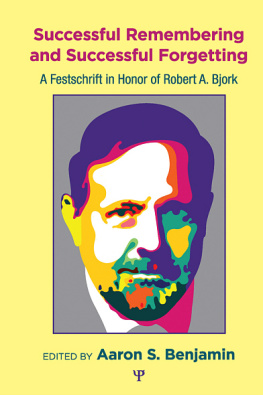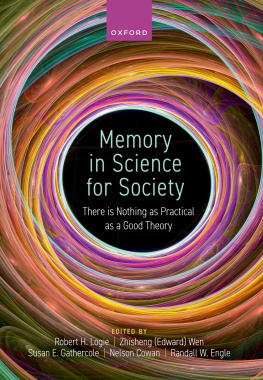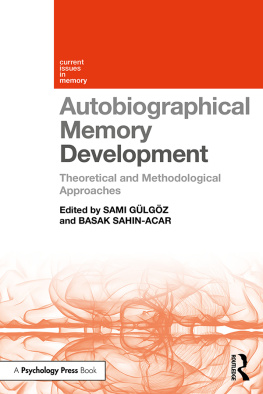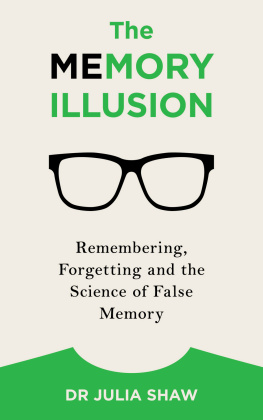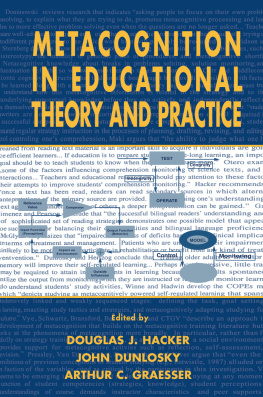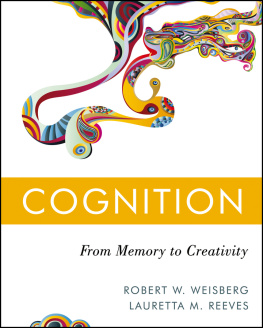Successful Remembering and Successful Forgetting
Successful Remembering and Successful Forgetting
A Festschrift in Honor of Robert A. Bjork
EDITED BY Aaron S. Benjamin

New York London
Psychology Press
Taylor & Francis Group
270 Madison Avenue
New York, NY 10016
Psychology Press
Taylor & Francis Group
27 Church Road
Hove, East Sussex BN3 2FA
2011 by Taylor and Francis Group, LLC
Psychology Press is an imprint of Taylor & Francis Group, an Informa business
This edition published in the Taylor & Francis e-Library, 2011.
To purchase your own copy of this or any of Taylor & Francis or Routledges collection of thousands of eBooks please go to www.eBookstore.tandf.co.uk.
International Standard Book Number: 978-1-84872-891-2 (Hardback)
For permission to photocopy or use material electronically from this work, please access www.copyright.com (http://www.copyright.com/) or contact the Copyright Clearance Center, Inc. (CCC), 222 Rosewood Drive, Danvers, MA 01923, 978-750-8400. CCC is a not-for-profit organization that provides licenses and registration for a variety of users. For organizations that have been granted a photocopy license by the CCC, a separate system of payment has been arranged.
Trademark Notice: Product or corporate names may be trademarks or registered trademarks, and are used only for identification and explanation without intent to infringe.
Library of Congress Cataloging-in-Publication Data
Successful remembering and successful forgetting : a festschrift in honor of Robert A. Bjork / edited by Aaron S. Benjamin.
p. cm.
Includes bibliographical references and index.
ISBN 978-1-84872-891-2 (hardcover : alk. paper)
1. Memory. I. Bjork, Robert A. II. Benjamin, Aaron S.
BF371.S86 2011
153.12--dc22 2010041648
Visit the Taylor & Francis Web site athttp://www.taylorandfrancis.com
and the Psychology Press Web site athttp://www.psypress.com
ISBN 0-203-84253-7 Master e-book ISBN
To my mentors: Dad, Herb, Ken, Gus, and Bob, of course
CONTENTS
ROBERT A. BJORK
|
HENRY L. ROEDIGER III AND JEFFREY D. KARPICKE
|
THOMAS K. LANDAUER
|
AARON S. BENJAMIN AND BRIAN H. ROSS
|
BENJAMIN C. STORM
|
MICHAEL C. ANDERSON AND BENJAMIN J. LEVY
|
MALCOLM D. MACLEOD AND JUSTIN C. HULBERT
|
STEVEN M. SMITH
|
MARK A. MCDANIEL AND ANDREW C. BUTLER
|
CATHERINE O. FRITZ
|
WILLIAM B. WHITTEN II
|
MARCIA C. LINN, HSIN-YI CHANG, JENNIFER L. CHIU, ZHIHUI HELEN ZHANG, AND KEVIN MCELHANEY
|
JANET METCALFE
|
ALICE F. HEALY, JAMES A. KOLE, ERICA L. WOHLDMANN, CAROLYN J. BUCK-GENGLER, AND LYLE E. BOURNE JR.
|
ASHER KORIAT, AINAT PANSKY, AND MORRIS GOLDSMITH
|
HARRY P. BAHRICK, MELINDA K. BAKER, LYNDA K. HALL, AND LISE ABRAMS
|
ELIZABETH LIGON BJORK, BENJAMIN C. STORM, AND PATRICIA A. DEWINSTANLEY
|
NATE KORNELL
|
BARBARA A. SPELLMAN, ELIZABETH R. TENNEY, AND MARGARET J. SCALIA
|
THOMAS D. WICKENS
|
TROY A. SMITH AND DANIEL R. KIMBALL
|
JOYCE M. OATES AND LYNNE M. REDER
|
BETHANY STANGL, ELLIOT HIRSHMAN, AND JOSEPH VERBALIS
|
ALAN RICHARDSON-KLAVEHN
|
DANIEL L. SCHACTER, BRENDAN GAESSER, AND DONNA ROSE ADDIS
|
Preface
In January 2009, the University of California, Los Angeles hosted a conference in which only a small portion of the many friends, mentors, colleagues, and students of Robert Bjork came together to discuss current research on human memory and to celebrate together the many traditions and friendships that mark Bobs career. There is an awkwardness to convening such a legacy event to a career that is still very much unfolding, but reviewing even the fraction of Bobs career now in the rearview mirror revealed such a creative and diverse array of themes that we were thankful for the opportunity to catch our breath and start thinking about the sequel to this book for the future.
The conference and this volume would not have been possible were it not for a Festschrift grant generously provided by the American Psychological Association, supplementary funding provided by the UCLA College of Letters and Science and the UCLA Department of Psychology, and assistance with this book provided by the Association for Psychological Science. Special gratitude is owed to the foot soldiers at UCLA who handled the logistics of the event: Jami Jesek, Cat Zimmerman, and Deanna Evans.
The chapters in this volume are a testament to the many ways in which Bobs ideas have shaped the course of research on human memory over the past four decades. The idea that forgetting is an adaptive response to the demands of a retrieval system fraught with competition finds considerable discussion here. This attention is not surprising; such ideas have helped recalibrate conceptualizations of memory away from one in which the computer is the dominant metaphor. The first eight chapters of this volume pursue this theme in various forms.
Bobs career is also marked by a commitment to using educational and training settings in the real world as a proving ground for psychological findings and theories. This is reflected in aspects of his service to the field, including his co-founding of the influential journal Psychological Science in the Public Interest, his many awards for distinguished teaching and service, and his chairmanship of the National Research Council Committee on Techniques for the Enhancement of Human Performance. through 14 of this volume review current issues and techniques in the application of research on learning and memory to enhancing human performance.
The remaining chapters address topics that are relevant to the translation of cognitive psychology to human performance. Bob was the first to recognize the critical role of metacognition in such problemsif learners hold misconceptions of their own levels of knowledge and skills, then they are unlikely to be able to guide their own learning effectively. Current research in metacognition is covered in through 19. The final chapters cover a variety of issues related to how remembering can be enhanced, how research on remembering can be profitably guided by the use of mathematical modeling, and how biological data can be brought to bear on theorizing about memory.
It is no accident that the topics in this volume align rather poorly with the organization of a traditional textbook on human memory. Bobs research has never been guided by the boutique theorizing that follows current trends, nor by cycles of popular interest or funding availabilityexcept insofar as his research has driven those cycles. Bobs research represents a somewhat renegade tradition that he has worked to pass on to the many students, postdoctoral fellows, and faculty with whom he has collaborated. I, along with all of the authors in this volume, hope that the chapters here represent this tradition well and that they serve as a reminder of the gratitude we all have to Bob for his leadership, guidance, and friendship.

